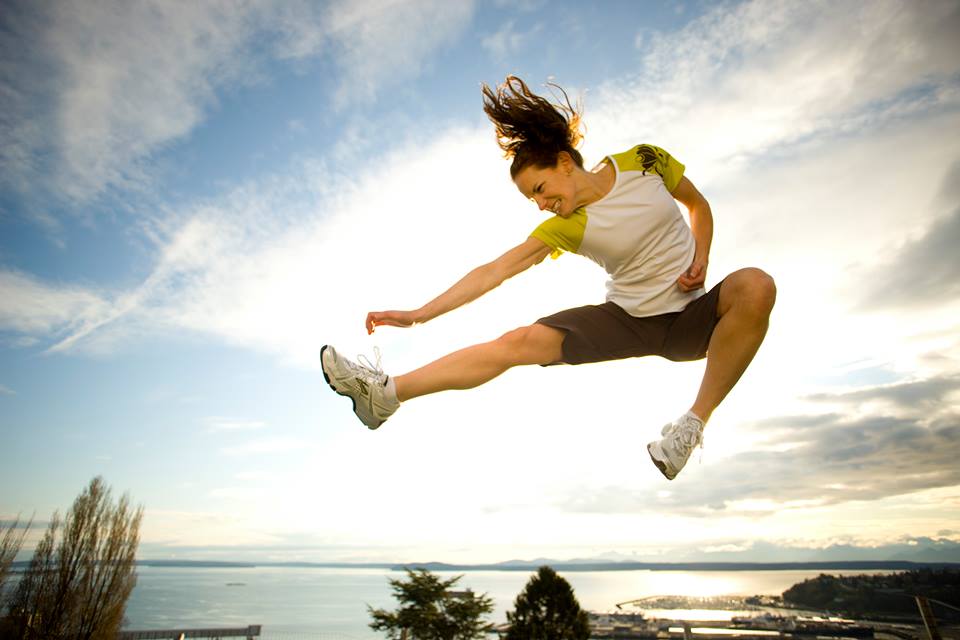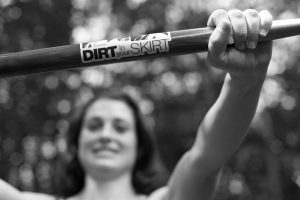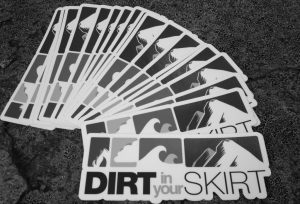Dirt in Your Skirt Athlete Profile Series – Rose Wetzel-Sinnett
 I first met Rose Wetzel-Sinnett prior to the start of the Atlas Race in Temecula California. Her reputation although new on the Obstacle Racing Circuit was already making it’s rounds, some true, some not so true. But one thing is for sure she is fast, she is hungry, and she is ready to take the obstacle racing world by storm. This 32 year-old is currently on the Spartan Race Pro-Team, as well as sponsored by InHealth, Wallingford Massgae Studio, and Seven Hills Running Shop. When not blazing through the course on race day she is a certified trainer and coach in Seattle Washington. Learn more about Rose…
I first met Rose Wetzel-Sinnett prior to the start of the Atlas Race in Temecula California. Her reputation although new on the Obstacle Racing Circuit was already making it’s rounds, some true, some not so true. But one thing is for sure she is fast, she is hungry, and she is ready to take the obstacle racing world by storm. This 32 year-old is currently on the Spartan Race Pro-Team, as well as sponsored by InHealth, Wallingford Massgae Studio, and Seven Hills Running Shop. When not blazing through the course on race day she is a certified trainer and coach in Seattle Washington. Learn more about Rose…
How did you get involved in your sport?
As a kid, I ran around outside and climbed on trees whenever I got the chance to! I remember beating all the boys in P.E. in grade school, so I figured I’d turn out for track in high school. I had a blast! After running in college and taking some time after college to explore new activities (such as triathlons and super long bike rides), I began to miss the sport and I returned to it with a renewed passion. After breaking all of my personal records from college, I decided to give the new sport of obstacle racing a go after my friends Chad and Monique told me it was the perfect sport for me.
Were you always an athlete?
Yep, my oldest brother, Eddie noticed I had a lot of natural speed and athleticism as a kid, so we spent many summer evenings kicking a soccer ball and throwing a football in the street.
What are some of your athletic achievements?
High School: two 3A state championship titles in the 800 meter race, 3rd in state in the mile and in cross country, 4×400 meter relay school record holder
College: NCAA Junior All-American in the 1500 meter race, Big East 4×800 meter relay champion
Post-collegiate: Nine-time USATF club track and field champion
Boston Marathon qualifier
What are your goals for the upcoming season?
I want to be a legitimate contender for the win at each of the Spartan championship races. I’d also like to build my social media presence to gather a following and create a platform from which I can educate, guide, and inspire others toward a healthier lifestyle.
Who is/are your inspiration?
Tim Sinnett (my husband and partner) keeps me grounded. His kind eyes and calm demeanor remind me, (as I’m frantically running around most days trying to pack far more into a day than is possible), that no matter what, everything is going to be okay. His words of empowerment and support when I’m stressed remind me that whatever may be going on in my life, I can handle it.
I also find inspiration from my parents, my siblings, and anyone else who has overcome major physical and/or mental adversity.
What is your most proud moment in sport?
My sophomore year of high school, I became a state champion for the first time by winning the 800 meters (1/2 mile) race in 2 minutes and 13 seconds. Walking up to get honored at the school assembly gave me an incredible rush, and as hundreds of students and teachers clapped for me, I felt truly respected for the first time in my life.
What is your most proud moment in life?
Wow, great question! Let’s see…my initial thought is that it would be a toss-up between the second year of my personal training career (when my client, Rob lost 75 pounds and I broke the company’s sales record) and hitting my goal of graduating from college with academic honors. The more I think about it, though, the more I realize that, as corny as it sounds, I’m most proud of myself when I feel like the time I’ve spent on my personal development starts to show through. For instance, whenever I choose to forgive someone rather resent them, or be happy for someone rather than jealous of them, I feel proud of myself on a deep level.
How do you overcome a bad race or training day?
I assess the situation to see what can be done to help it. If I have a nagging injury coming on, I ice the area, elevate it, massage it, etc. If it’s a race that just didn’t go as well as expected, I review the race in my mind and determine what I can do next time to increase my odds of getting the desired outcome.
In 17 years of training and racing, I’ve had plenty of bad training days and races, trust me. To deal with the mental/emotional side of things, I take the emphasis off of me and my bad race by finding a way to contribute to society in a way that has nothing to do with my ability to perform athletically. If my arms and hands fail me at, say, throwing a spear or climbing a traverse wall, I’m reminded of their value when I use them to give a hug or help out a family member. One of my favorite ways to do this is by leading the kids’ race after my race because even if I have a bad race, it doesn’t matter to the kids. All they care about is whether or not I make funny faces, give them high-fives, and get them excited to race their race! At the start of the kids’ race, it’s not about me anymore, and that can be a nice relief/distraction after a bad race. I also like to hang out with my brother who suffers from a chronic mental illness and has never had even a fraction of the life experiences I’ve had the privilege of experiencing. Doing so gives me perspective in reminding me how lucky I am to be out there doing what I love to do and being successful at it, even amidst an acute bad race experience.
What is your training routine like?
I run 6-7 days a week (like I’ve done for half my life!) and now I’ve increased my usual 1-2 strength training days a week to 3-4, looking to get stronger, adding in some classic strength-training (e.g. deadlifts, squats, and presses) with more obstacle-specific strength work (e.g. rope climbs, burpees, sandbag carries, and tire flips). A typical running week includes a hill-repeat day, a drills + strides day, a tempo run or interval day, a long run day, and a couple of easy running days.
What advice would you give to someone starting out in your sport?
Consistency is key. Increase your mileage or intensity by no more than 10% each week. Make sure your designated hard days are hard and your easy days are easy. Take care of yourself on a holistic level, with not only exercise and healthy food, but also plenty of water, sleep, and recovery time.
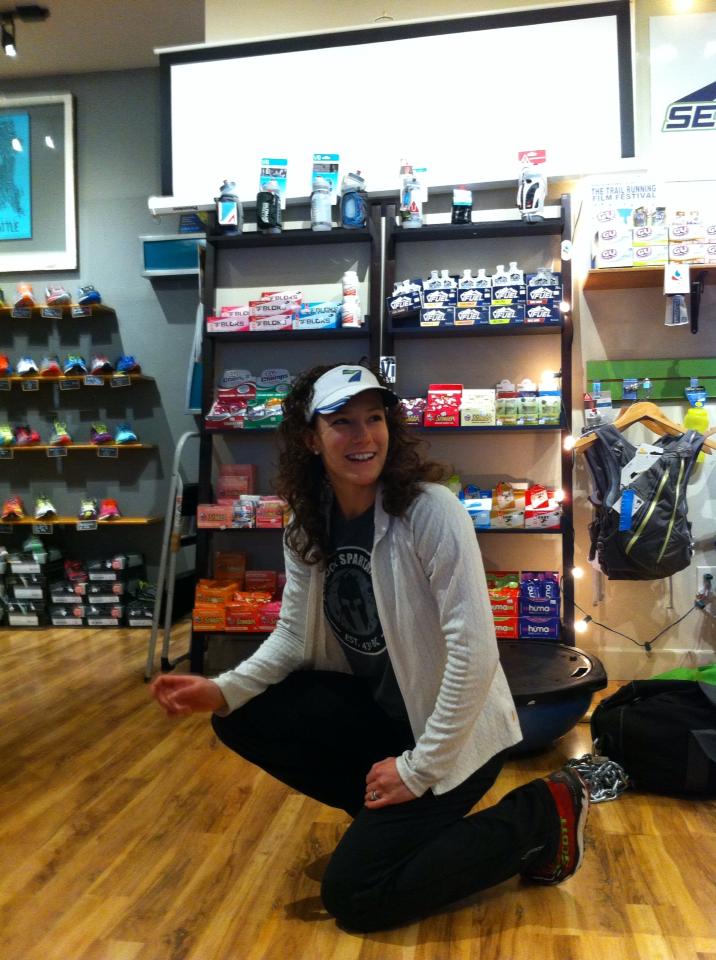 What is your favorite pre-race and post-race food?
What is your favorite pre-race and post-race food?
Pre-race: oatmeal with nuts and berries
Post-race: protein shake and banana right after the race; then meat, veggies, and ice cream for dinner/dessert
When not training and competing what do you do with your down time?
I enjoy eating tasty food with my “foodie” hubby and friends, watching comedies and suspense/action movies, and going to birthday parties, weddings, baby showers, fairs, festivals, art walks, and outdoor markets. I love traveling and I’ve been fortunate enough to get to soak up the local culture in many wonderful countries, such as Brazil, Mexico, Ecuador, Spain, France, Ireland, and Thailand.
I also enjoy networking and socializing with friends on Facebook, doing marketing and exercise research for my business, taking online classes from Social Media University, reading books for personal development such as Daring Greatly and The 22 Laws of Wellness, volunteering, and dancing around the kitchen in my socks!
What is your favorite quote to motivate you?
“Bloom where you’re planted” my Mom once told me, and it really stuck with me. I interpreted it as a message to “work with what you’ve got.” Though I may have grown up in relative poverty (relative to the average American), a couple of trips in my adulthood to a few developing countries opened my eyes to what absolute poverty is like and it made my realize just how many opportunities I’ve had growing up in the states.
What is the best advice a coach ever gave you?
Coach Helmer, my college coach always said, “Bring to each practice the best body that you can – one that is well-rested, well-nourished, well-hydrated, and mentally ready to roll.” Each and every practice/workout provides a valuable opportunity to get better and thus closer to my goals. I must treat each practice with the respect it deserves, understanding how fortunate I am to be out there, doing what I love, and striving for lofty goals. I ask for this from the individuals I train and coach as well.
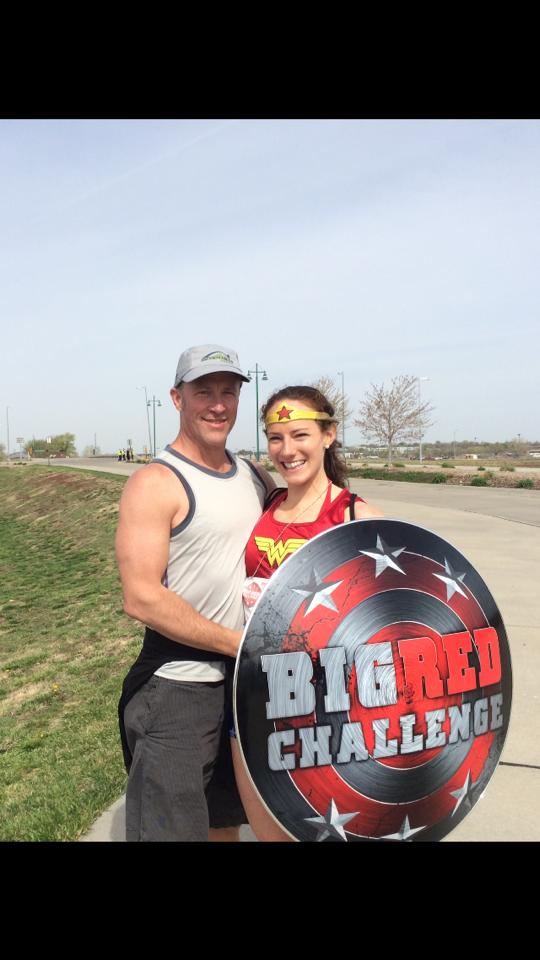 If you could share some advice to the next generation of athletes, what would it be?
If you could share some advice to the next generation of athletes, what would it be?
My advice would be to enjoy yourself, enjoy the moment, and enjoy the process. Set goals and work hard, yes, of course. But keep perspective and try to ask yourself as various points in your training and your racing, “Am I enjoying this, overall?” Even when it’s painful, am I still, in general, proud of myself and getting some sort of enjoyment out of this? Two years ago I caught myself crying after a race I didn’t do as well in as I have in the past and I realized that I no longer wanted to give a “bad” race the power to sour the rest of my day. When I’m in a bad mood from a bad race, I’m not as able to be a loving, attentive partner to my husband. When I’m consumed with my own self-imposed misery, I lose precious opportunities to enjoy this short life we have. When one races as often as I do, some days are bound to be “off” days. Falling short of my expectation leaves me disappointed, and I allow myself to feel bummed, no doubt, because I work very hard and I care about my performance. I do my best, however, to get caught up in the joy of those around me who did well and/or have a good attitude.
Sometimes in our society, we can get caught up in the mindset of “I’ll be happy when ________” (e.g. I find the right job, get married, have kids, get a promotion, retire, etc.) and we can (or at least I can) forget to be happy NOW. It’s worth the effort to find that delicate balance between striving for more/better and finding contentment and satisfaction in the current moment.
Follow Rose: Facebook & Twitter






